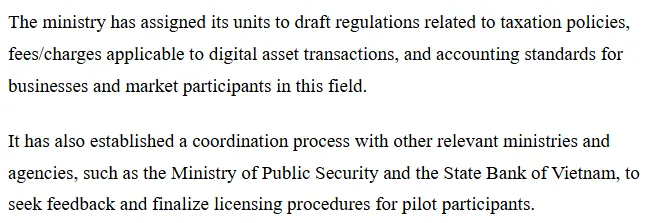Five Firms to Join Vietnam’s Regulated Crypto Exchange Plan

- Vietnam approves a five-year pilot allowing only five licensed crypto exchanges.
- Strict capital rules and ownership limits delay formal applications from companies.
- Authorities aim to strike a balance between innovation and control within the Industry.
Vietnam’s Ministry of Finance has announced that its pilot program for regulated cryptocurrency exchanges will allow a maximum of five licensed entities. The decision, issued under Resolution No. 05/2025/NQ-CP on September 9, 2025, signals a measured step toward integrating digital assets into the national economy. The government seeks to regulate the emerging market while maintaining strong oversight of taxation, anti-money laundering compliance, and investor protection.
Limited Participation and Slow Start
Speaking at a press conference on October 5, Deputy Finance Minister Nguyen Duc Chi confirmed that there has been no formal interest from businesses so far. Although the ministry plans to approve up to five participants, it has yet to receive any official proposals. Chi stated that authorities are working to accelerate the licensing process so that at least one exchange can launch before 2026.
The schedule of the pilot programme will be decided primarily by how fast the companies fulfil the harsh conditions set in the resolution. Vietnam intends to control entry into the market to keep systemic risk low, ensuring that only financially sound and technically capable entities are qualified. A limited number of operators can be monitored by the regulators; hence, they will be able to present more mechanisms for taxation and reporting on a trial basis before generalization.
The high barrier to entry has been another major factor slowing the scheme down. To be qualified for approval, companies must satisfy specific capital, human resource, operational, and other requirements. The minimum charter capital demanded is 10 trillion VND (approximately $379 million), and at least 65% of the shares must be held by institutional investors such as banks, securities firms, or technology companies. Additionally, the foreign ownership stake may be less than 49%, a matter that greatly restricts the potential applicant pool.
Strict Oversight and Regulatory Coordination
The pilot framework incorporates extensive taxations, considerations, and compliance standards related to AML issues on crypto transactions. Each enterprise must maintain open operations and undergo continuous auditing to ensure consumer protection and financial accountability.
Therefore, it is common for the Ministry of Finance to liaise closely with the State Bank of Vietnam and the Ministry of Public Security in licensing, data sharing, and enforcing compliance. This unusual coordination has since been the first-ever approach by a government body to monitor financial integrity in relation to security risks.

This initiative falls within the broader legal framework, which encompasses the Law on the Digital Technology Industry, promulgated in June 2025. The law recognizes crypto assets and makes licensing obligatory for crypto service providers. The law lays the groundwork for Vietnam’s cautious yet progressive approach to regulating the digital economy.
However, no company has yet applied, although conversations are underway at an early stage with several prospective applicants. Some companies are concerned that this might favor large players to the detriment of small-scale innovators, thereby limiting market options and slowing down fintech development.
Related: Vietnam Moves to Regulate Crypto Amid Growing Adoption
Controlled Innovation and Long-Term Vision
Vietnam’s move is one of “measured experimentation”. Rather than opening the market strongly, the government is operating within a confined and closely supervised environment of digital asset operations. Such a sandbox pilot enables authorities to observe trading behaviours, collect operational data, and adjust policies before scaling implementation across the country.
In contrast, other Southeast Asian countries, such as Singapore and the Philippines, have adopted models of free participation that foster competition from smaller fintechs willing to experiment with fewer barriers. Vietnam’s approach, although arguably offering stability, may inhibit competition and liquidity in the short term.
Using this mechanism, the government aims to integrate blockchain and cryptocurrency trading into its financial infrastructure, while maintaining oversight of transparency, security, and tax-related aspects of the industry.




